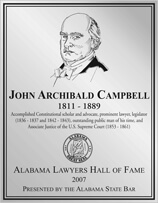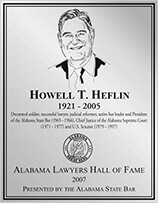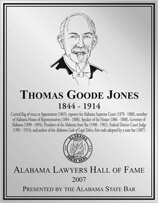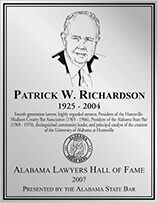-
John Archibald Campbell (1811 - 1889)
-
 John Archibald Campbell was born in Wilkes County, Georgia on June 24, 1811. His forebears came from Scotland and they first settled in North Carolina. Both of his grandfathers served in the Revolutionary War.
John Archibald Campbell was born in Wilkes County, Georgia on June 24, 1811. His forebears came from Scotland and they first settled in North Carolina. Both of his grandfathers served in the Revolutionary War.
Campbell was educated in Athens, Georgia and received an appointment to West Point from Senator John C. Calhoun. He left West Point due to the death of his father. From there he came to Montgomery, Alabama, studied law, and was admitted to the Bar of Alabama in 1830. He was not yet 20 years old. Campbell practiced law in Montgomery until 1837 when he moved to Mobile. He was involved in the civic life of every place where he lived and he served in the state legislature representing Montgomery County from 1836 to 1837 and representing Mobile County from 1842 to 1843.
In 1852 Campbell declined appointment to a seat on the Alabama Supreme Court. But on March 22, 1853 he became a member of the United States Supreme Court, being appointed by President Franklin Pierce. It is interesting to note that Justice Campbell carried on the tradition of an “Alabama” seat on the Supreme Court by replacing Justice John McKinley, also from Alabama, who served on the Court from 1837 to 1852. At this same time, William Rufus King of Alabama, and a previous inductee to the Alabama Lawyers’ Hall of Fame, was Vice-President of the United States.
Campbell was a Supreme Court Justice during a tumultuous time in our nation’s history. Having been born in the South and having lived in the South, he resigned from the Supreme Court on May 1, 1861 to return to the South. Prior to his resignation he served as an informal mediator between the Confederate government and Federal authorities in March and April 1861.
After leaving the Court he served as Confederate Assistant Secretary of War from October 1862 to the end of the war. In 1865, Campbell and others met with President Lincoln and Secretary of State William Seward at Hampton Roads, Virginia in a secret attempt to end the war. This effort failed and Lincoln’s assassination ended all hope for a lenient reconstruction.
Following the war, Campbell was imprisoned at Fort Pulaski, Georgia for six months. After his release, he resumed the practice of law in Alabama and Louisiana, relocating to New Orleans in 1866. He appeared before the United States Supreme Court in the famous Slaughterhouse Cases that arose in New Orleans and he was involved in lawsuits by New Hampshire and New York against the state of Louisiana. In 1877 he was one of Samuel Tilden’s attorneys before the Electoral Commission which decided the presidential election in favor of Rutherford B. Hayes. In his later years he resided in Baltimore where he died on March 13, 1889.
John Archibald Campbell is remembered as an able judge, a successful lawyer, and an outstanding public man of his time. He is today honored as a member of the Alabama Lawyers’ Hall of Fame.
-
Howell T. Heflin (1921 - 2005)
-
 Howell Thomas Heflin was born on June 19, 1921 in Poulan, Georgia, the son of the Reverend Marvin Rutledge Heflin, a Methodist minister, and Louise Strudwick Heflin. The family moved to Colbert County, Alabama where Howell graduated from high school and then he attended Birmingham-Southern College from which he graduated in 1942.
Howell Thomas Heflin was born on June 19, 1921 in Poulan, Georgia, the son of the Reverend Marvin Rutledge Heflin, a Methodist minister, and Louise Strudwick Heflin. The family moved to Colbert County, Alabama where Howell graduated from high school and then he attended Birmingham-Southern College from which he graduated in 1942.
Heflin served in the Marine Corps during World War II. He fought in the Pacific Theater, was wounded twice, and was awarded the Purple Heart and the Silver Star for bravery. He ended his service with the rank of Major and then enrolled at the University of Alabama School of Law, graduating with the “great class” of 1948, a majority of whom were military veterans.
From 1948 to 1971, Heflin practiced law in Tuscumbia. During those years he served as the founding President of the Alabama Law School Alumni Association (1949). He was honored by his fellow attorneys with the presidencies of the Alabama Trial Lawyers Association (1963-1965) and the Alabama State Bar (1965-1966). He also served as chairman of the Alabama Ethics Commission (1969-1971). In 1969 he helped found and served as first chairman of the Farrah Law Society at the University of Alabama School of Law.
Throughout his years of practice, Heflin was known as a “country lawyer” who specialized in a general trial practice of both criminal and civil cases. He was even referred to by some as the “Perry Mason” of North Alabama.
When Heflin became President of the Bar, his goal was to reform the state bar association, but in doing that a mandate arose for reform of the entire Alabama judicial system. Within a few months he had appointed over 25 new committees to undertake the work of examining the many issues facing the Bar and the legal system of Alabama. Heflin is well known for his leadership in the passage of the Judicial Article that revised Alabama’s 1901 constitutional provisions regarding the courts. It may not be as well known that many other reforms came about due to the efforts he started with the committees in 1965.
During his presidency, the process began to create Alabama’s Judicial Commission, to eliminate the Justice of the Peace system, to adopt new rules of Civil, Criminal, and Appellate Procedure and a new Code of Ethics for lawyers, to revise lawyer grievance procedures, to recodify the Code of Alabama, and to create a retirement system for judges. The committees also started the work that created the CLE programs at Alabama’s law schools, expanded Legal Aid and indigent defense programs in Alabama, and established the Client Security Fund. They also led to a reorientation of the editorial policy of the Alabama Lawyer magazine under a Board of Editors and the creation of the Alabama Law Institute.
Heflin became Chief Justice of the Alabama Supreme Court in 1971. When he assumed office, the court system was decentralized and inefficient, still tied to the requirements of the 1901 Constitution and the procedural habits of 19th Century lawyers. He was the first sitting Chief Justice to mount a successful campaign for structural and procedural reform. Everyone knew it was needed. He organized the process through his wide network of allies and got the job done. The shining triumph of his effort was the 1973 constitutional amendment that re-wrote the 1901 Judicial Article.
In 1978 Heflin was elected to the United States Senate. He served four years as chairman of the Select Committee on Ethics. He was also a long-standing and influential member of the Judiciary Committee, was a proponent of the Tennessee-Tombigbee Waterway, promoted federal assistance to education, and was a supporter of NASA and Alabama-based space industries.
Heflin retired from the Senate in 1997. He returned to the practice of law and in the spring of 1998 served as Distinguished Senator-in-Residence at the University of Alabama Law School. He died on March 29, 2005. Because of his many services to the people of Alabama, no one deserves recognition in the Alabama Lawyers’ Hall of Fame more than Howell T. Heflin.
-
Thomas Goode Jones (1844 - 1914)
-
 Thomas Goode Jones was born at Macon, Georgia on November 26, 1844. He was the son of parents who were both descendants of Colonial Virginia families. His family moved to Montgomery, Alabama where Thomas received his early education. He also studied at private schools in Virginia and he attended the Virginia Military Institute where one of his distinguished professors was Stonewall Jackson.
Thomas Goode Jones was born at Macon, Georgia on November 26, 1844. He was the son of parents who were both descendants of Colonial Virginia families. His family moved to Montgomery, Alabama where Thomas received his early education. He also studied at private schools in Virginia and he attended the Virginia Military Institute where one of his distinguished professors was Stonewall Jackson.
Jones left VMI in 1862 to enlist in the Confederate Army. He attained the rank of major, saw combat with the Army of Northern Virginia, was wounded four times, and carried the flag of truce at Appomattox.
He returned to Montgomery after the war where he read law and was admitted to the Bar in 1868. In 1866 he married Georgena Caroline Bird of Montgomery and eventually fathered thirteen children. For a time he was a newspaper editor. From 1870 to 1880 he served as reporter for the Alabama Supreme Court. He was elected to the legislature and served as Speaker of the House from 1886 to 1888. In 1890 he was elected Governor and re-elected in 1892. He was President of the Alabama Bar Association during the 1900-1901 term of office. And, in 1901, President Theodore Roosevelt appointed Jones to a Federal judgeship where he served until his death on April 28, 1914.
This brief sketch outlines the highlights of a long and distinguished career. However, Thomas Goode Jones is probably most remembered for his authorship of the Alabama Code of Ethics, the first such code adopted in this country on December 14, 1887. Nevertheless, the code could have been adopted several years earlier. Matters moved slower in those days. The story of how the code came about was written by his son, Judge Walter B. Jones, in an article for the Notre Dame Lawyer legal journal, for which he wrote several articles, and which was first published in May of 1932. It was later reprinted in the Alabama Lawyer in the July 1941 issue. Here now is a summary of how the code came to be written by Thomas Goode Jones.
Summer 1881: Thomas Goode Jones was chairman of the Alabama State Bar Association Committee on Judicial Administration and Remedial Procedure. The committee recommended that the Association appoint a special committee to report back with a Code of Legal Ethics for consideration by the entire body at the next annual meeting. This was the first formal proposal for a legal ethics code.
1882 Annual Meeting: The Jones recommendation was not acted upon until the next annual meeting. A motion was made to appoint a three person committee with Thomas Goode Jones as chairman. The motion carried but due to a misunderstanding, the two other members of the committee were not appointed. Jones did not feel that he could proceed with such important work alone.
1883 Annual Meeting: The next meeting was the fifth annual meeting of the Alabama Bar Association. It took place at Blount springs, which was the Gulf Shores of its day. At this convention, Jones was chairman of the Executive Committee. He again recommended the appointment of a special committee of three to report at the next annual meeting a Code of Legal Ethics for the Bar of Alabama. The committee was appointed but it appears that Jones did all of the drafting. He submitted his work to the other two members.
1884 Annual Meeting: This meeting of the Association took place in Birmingham. A report from the special committee was called for but Jones asked for additional time stating that the work was of such importance it should not be hurried. He was seeking the advice of attorneys throughout the state by correspondence. Remember, this was before the days of faxes, e-mails, and even phones. The request for further time was granted.
Later in 1884: A meeting of the Bar Association took place at the State Capitol. The report of the special committee was called. Jones was absent. It was reported to the body that his duties in the legislature were so pressing that he could not review the report and so consideration was postponed.
1885 Annual Meeting: The next annual meeting of the Bar Association took place in Montgomery. The report was made that a code had been drafted but that Jones was involved in court and could not attend the convention. The report for consideration was passed for another year.
December 2, 1886: The 1886 annual meeting of the Association took place in Montgomery. The report was called for but since the legislature was meeting and Thomas Goode Jones was Speaker of the House, he could not attend the morning session. His representative asked that the matter of the Code of Ethics be considered in the afternoon session at 4 o’clock. Then at four, Jones reported to the convention that an accident prevented him from presenting the report. His shorthand writer had placed the report written from his notes on his desk near an open window. It appeared that part of the code was blown out of the window and was lost. He begged the indulgence of the Association one more time.
December 14, 1887: The 1887 annual meeting of the Alabama Bar Association again took place in Montgomery. The committee finally reported to the Association. The code was read by Jones, section by section, in the morning. The afternoon session was devoted to discussing the document. The code was approved.
This code was the first Code of Legal Ethics adopted in the United States. It became the foundation of the American Bar Association Canons of Ethics. Thomas Goode Jones had prepared the code without any manual or guide with the exception of an essay on ethics written by a Pennsylvania judge in 1854. For this act and his lifetime of services, the lawyers of Alabama induct Thomas Goode Jones into the Alabama Lawyers’ Hall of Fame.
-
Patrick W. Richardson (1925 - 2004)
-
 Patrick William Richardson was born in Huntsville, Alabama on October 5, 1925. He graduated as valedictorian from Huntsville High School and then attended the University of Alabama where he received an undergraduate degree in 1947 and a law degree in 1948. While at the law school he was inducted into the Farrah Order of Jurisprudence, which later became the Order of the Coif. After his graduation, Richardson returned to Huntsville to practice law. He was the fourth generation of the Richardson family to become an attorney. Richardson served as President of the Huntsville-Madison County Bar Association from 1965 to 1966 and as President of the Alabama State Bar from 1969 to 1970. For over fifty years he was counsel to the L & N and Southern railroads. He was an active member of the Railroad Trial Counsel. He was admitted to the American College of Mortgage Attorneys and was known for his mentoring of young attorneys as well as for the promotion of higher education.
Patrick William Richardson was born in Huntsville, Alabama on October 5, 1925. He graduated as valedictorian from Huntsville High School and then attended the University of Alabama where he received an undergraduate degree in 1947 and a law degree in 1948. While at the law school he was inducted into the Farrah Order of Jurisprudence, which later became the Order of the Coif. After his graduation, Richardson returned to Huntsville to practice law. He was the fourth generation of the Richardson family to become an attorney. Richardson served as President of the Huntsville-Madison County Bar Association from 1965 to 1966 and as President of the Alabama State Bar from 1969 to 1970. For over fifty years he was counsel to the L & N and Southern railroads. He was an active member of the Railroad Trial Counsel. He was admitted to the American College of Mortgage Attorneys and was known for his mentoring of young attorneys as well as for the promotion of higher education.
Pat Richardson helped convince the University of Alabama to create an extension campus in Huntsville which later became the University of Alabama at Huntsville. He was described by a former UAH President as “being to UAH what Thomas Jefferson was to the University of Virginia”. He served as the first President of the UAH Foundation, later becoming a Trustee of the University, and he served as the attorney for the Foundation from 1961 until his death at Huntsville in 2004. Because of his faithful service to the school, he received an Honorary Doctor of Laws Degree from UAH in 1976 and he was the proud recipient of the first UAH class ring.
Pat Richardson was a solid citizen who contributed to his community in many ways throughout his life. He served as a Director of the Huntsville Industrial Expansion Committee, the Boys Club, and the United Way. He was a long-time member of the Huntsville Rotary Club. He was also a member of the National Conference of Christians and Jews (now called the National Conference for Community and Justice). He served on its national board from 1981 to 1986 and its regional board from 1987 until his death. In 1985 he received the NCCJ Brotherhood Award.
Pat Richardson led an exemplary life. He was a prominent citizen of his community who gave much service to that community. His other awards included the Humanitarian Award from the Arthritis Foundation, the Distinguished Service Award from the Huntsville-Madison County Chamber of Commerce, and the Award of Merit from the Alabama State Bar. Now he is honored with induction into the Alabama Lawyers’ Hall of Fame.
 John Archibald Campbell was born in Wilkes County, Georgia on June 24, 1811. His forebears came from Scotland and they first settled in North Carolina. Both of his grandfathers served in the Revolutionary War.
John Archibald Campbell was born in Wilkes County, Georgia on June 24, 1811. His forebears came from Scotland and they first settled in North Carolina. Both of his grandfathers served in the Revolutionary War. Howell Thomas Heflin was born on June 19, 1921 in Poulan, Georgia, the son of the Reverend Marvin Rutledge Heflin, a Methodist minister, and Louise Strudwick Heflin. The family moved to Colbert County, Alabama where Howell graduated from high school and then he attended Birmingham-Southern College from which he graduated in 1942.
Howell Thomas Heflin was born on June 19, 1921 in Poulan, Georgia, the son of the Reverend Marvin Rutledge Heflin, a Methodist minister, and Louise Strudwick Heflin. The family moved to Colbert County, Alabama where Howell graduated from high school and then he attended Birmingham-Southern College from which he graduated in 1942. Thomas Goode Jones was born at Macon, Georgia on November 26, 1844. He was the son of parents who were both descendants of Colonial Virginia families. His family moved to Montgomery, Alabama where Thomas received his early education. He also studied at private schools in Virginia and he attended the Virginia Military Institute where one of his distinguished professors was Stonewall Jackson.
Thomas Goode Jones was born at Macon, Georgia on November 26, 1844. He was the son of parents who were both descendants of Colonial Virginia families. His family moved to Montgomery, Alabama where Thomas received his early education. He also studied at private schools in Virginia and he attended the Virginia Military Institute where one of his distinguished professors was Stonewall Jackson. Patrick William Richardson was born in Huntsville, Alabama on October 5, 1925. He graduated as valedictorian from Huntsville High School and then attended the University of Alabama where he received an undergraduate degree in 1947 and a law degree in 1948. While at the law school he was inducted into the Farrah Order of Jurisprudence, which later became the Order of the Coif. After his graduation, Richardson returned to Huntsville to practice law. He was the fourth generation of the Richardson family to become an attorney. Richardson served as President of the Huntsville-Madison County Bar Association from 1965 to 1966 and as President of the Alabama State Bar from 1969 to 1970. For over fifty years he was counsel to the L & N and Southern railroads. He was an active member of the Railroad Trial Counsel. He was admitted to the American College of Mortgage Attorneys and was known for his mentoring of young attorneys as well as for the promotion of higher education.
Patrick William Richardson was born in Huntsville, Alabama on October 5, 1925. He graduated as valedictorian from Huntsville High School and then attended the University of Alabama where he received an undergraduate degree in 1947 and a law degree in 1948. While at the law school he was inducted into the Farrah Order of Jurisprudence, which later became the Order of the Coif. After his graduation, Richardson returned to Huntsville to practice law. He was the fourth generation of the Richardson family to become an attorney. Richardson served as President of the Huntsville-Madison County Bar Association from 1965 to 1966 and as President of the Alabama State Bar from 1969 to 1970. For over fifty years he was counsel to the L & N and Southern railroads. He was an active member of the Railroad Trial Counsel. He was admitted to the American College of Mortgage Attorneys and was known for his mentoring of young attorneys as well as for the promotion of higher education.